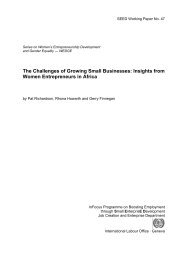manual: women workers' rights and gender equality - International ...
manual: women workers' rights and gender equality - International ...
manual: women workers' rights and gender equality - International ...
You also want an ePaper? Increase the reach of your titles
YUMPU automatically turns print PDFs into web optimized ePapers that Google loves.
The Labour Code 1997, Chapter 6, section 8, article 177 says that the minimum age for wage<br />
employment is set at 15 years. The minimum allowable age for any kind of employment or work,<br />
which, by nature, could be hazardous to the health, the safety or the morality of an adolescent is<br />
18 years. Children from 12 to 15 years can be hired to do light work provided that: the work is not<br />
hazardous to their health or mental <strong>and</strong> physical development <strong>and</strong> that the work will not affect their<br />
regular school attendance, their participation in guidance or vocational training programmes<br />
approved by a competent authority.<br />
Card 4: No to Discrimination, Yes to Equality (picture No. 27)<br />
Convention 100: Equal Remuneration, 1951<br />
Women <strong>and</strong> men have the right to equal remuneration for work of equal value. This means that<br />
<strong>women</strong> <strong>and</strong> men who do the same type of work or who do jobs of equal value but of a different<br />
kind should receive equal remuneration without any discrimination based on sex. Equal<br />
remuneration does not only mean equal pay of a wage or salary. It also includes equal pay for men<br />
<strong>and</strong> <strong>women</strong> of any other allowances or benefits such as family allowances, clothing, food or travel<br />
allowances, paid directly or indirectly by the employer to a worker in cash or in kind”. (See session<br />
4.3 Equality at Work for more details).<br />
Convention 111: Discrimination (Employment <strong>and</strong> Occupation), 1958<br />
This Convention is closely related to Convention 100. Men <strong>and</strong> <strong>women</strong> irrespective of their race,<br />
colour, sex, religion, political opinion, national extraction or social origin have the right to equal<br />
opportunity <strong>and</strong> treatment in employment <strong>and</strong> occupation. This includes equal access to<br />
employment, equal access to vocational training <strong>and</strong> guidance <strong>and</strong> <strong>equality</strong> in terms of conditions<br />
of work. Men <strong>and</strong> <strong>women</strong> should not be discriminated against, either directly or indirectly. This<br />
means that, for example, a law cannot prohibit <strong>women</strong> to access a vocational training course just<br />
because they are <strong>women</strong> or employers cannot intentionally hire only men. It also means that a law<br />
that allocates a family allowance to the head of the household may discriminate against <strong>women</strong><br />
when in practice (or by law) the head of the household is always considered the man or husb<strong>and</strong>.<br />
The Royal Government of the Kingdom of Cambodia ratified both Conventions.<br />
The Constitution, article 36.1, states that Khmer citizens of either sex shall have the right to choose<br />
any employment according to their ability <strong>and</strong> to the needs of the society. And article 36.2 states<br />
that Khmer citizen of either sex shall receive equal pay for equal work.<br />
The Labour Code 1997, chapter 1, section 2 deals with non-discrimination. It states: “No employer<br />
shall consider on account of race, colour, sex, creed, religion, political opinion, birth, social origin or<br />
membership of workers’ union of the exercise of union activities; to be the invocation in order to<br />
make a decision on: hiring, defining <strong>and</strong> assigning of work, vocational training, advancement,<br />
promotion, remuneration, granting social benefits or discipline or termination of employment<br />
contract”. In other words: discrimination on the basis of race, colour, sex, creed, religion, political<br />
opinion, birth, social origin <strong>and</strong> being an active member of a workers’ union is explicitly prohibited<br />
with regard to:<br />
• job security<br />
• access to employment<br />
• access to training<br />
• career advancement<br />
• salary <strong>and</strong> pay<br />
• working condition <strong>and</strong> social benefits<br />
• discipline <strong>and</strong> termination of job contract.<br />
56

















